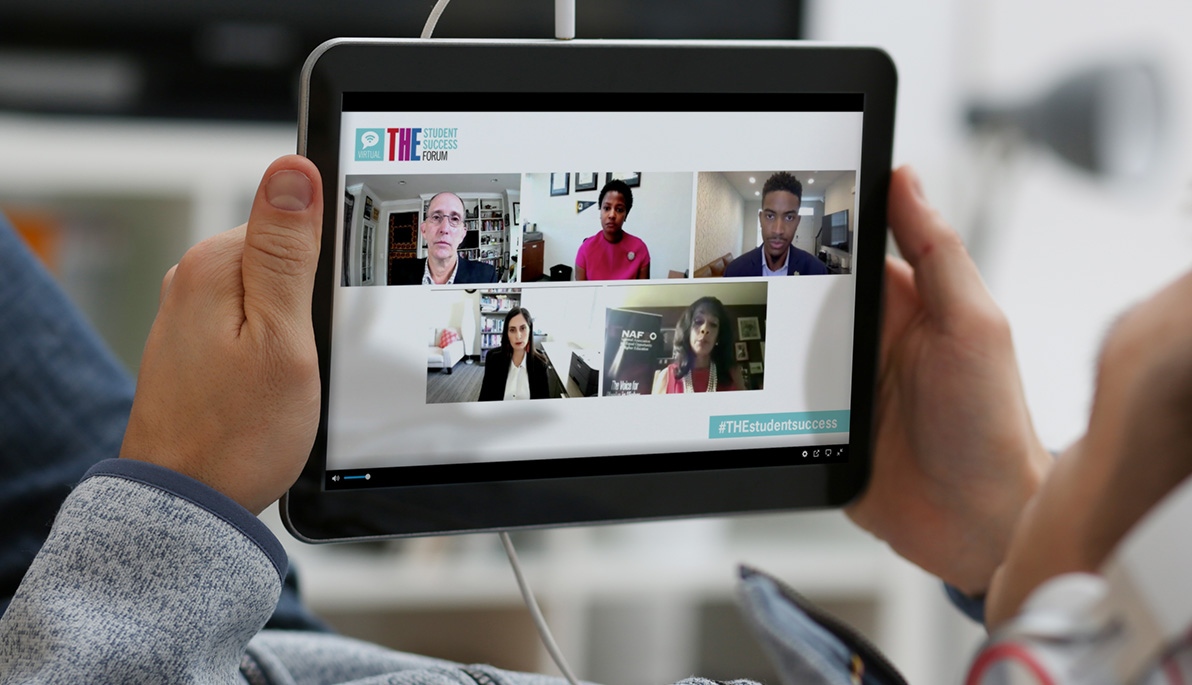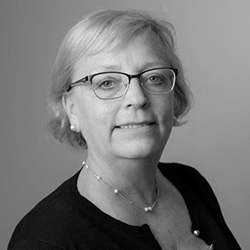News
New York Tech Rises in WSJ/THE Rankings
September 23, 2021
Pictured: At the annual Times Higher Education Student Success Virtual Forum, New York Tech Assistant Provost for Student Engagement and Development Tiffani Blake discussed “Doing More for the Diversity Agenda” with moderator Paul Basken; Lezli Baskerville of the National Association for Equal Opportunity in Higher Education, Creston Lynch from George Mason University, and Pardis Mardhavi from Arizona State University.
In this year’s ranking of 796 universities in the United States, published in the September 22 issue of The Wall Street Journal, New York Institute of Technology ascended 11 places vs. last year and is now ranked No. 253—among the top third of universities ranked annually by The Wall Street Journal/Times Higher Education (WSJ/THE).
The rankings are based on a study The Wall Street Journal conducts with Times Higher Education, with scoring based on 15 key indicators that assess colleges in four areas: Outcomes, Resources, Engagement, and Environment.
This year, New York Tech experienced a significant bump within the Outcomes pillar, which accounts for 40 percent of the ranking. Contributing to the 44-place increase in our overall Outcomes ranking was a significant improvement in our graduation rate. Other areas of improvement where we saw slight upticks included finance per student, papers per faculty, and faculty diversity. In addition, we continue to score highly in the Environment pillar, which measures outstanding numbers for inclusion, diversity, and international student representation.
Because of challenges posed by the COVID-19 pandemic, the student engagement survey was not conducted this year, and the WSJ/THE used student survey data from the 2020 rankings. Thus, the Engagement score was relatively unchanged from last year—making this year’s double-digit uptick overall even more significant.
New York Tech Administrator Participates in THE Panel Discussion
The rankings announcement coincided with the annual Times Higher Education Student Success Virtual Forum on September 22. This year, New York Tech Assistant Provost for Student Engagement and Development Tiffani Blake, M.Ed., joined moderator Paul Basken, the North American editor for Times Higher Education, and fellow panelists to discuss “Doing More for the Diversity Agenda.” Blake, along with Lezli Baskerville, J.D., CEO of the National Association for Equal Opportunity in Higher Education; Creston Lynch, Ph.D., assistant vice president of university life at George Mason University; and Pardis Mardhavi, Ph.D., dean of Social Sciences and director of the School of Social Transformation at Arizona State University (ASU), covered a range of diversity, equity, and inclusion (DEI) topics during their one-hour virtual panel discussion
The diversity experts discussed DEI initiatives at their respective colleges and agencies, particularly those focusing on improving faculty diversity, adjusting curricula as well as internal and external policies to advance systemic change within all universities, enhancing the STEM pipeline to attract and support first-generation students, and developing resources, forums, and networks for those students to succeed personally, academically and professionally, among other topics.
Blake emphasized the importance of having students participate in DEI initiatives inside and outside the classroom, noting how New York Tech approached a recent overhaul of its academic integrity policy. “There are policies and procedures that many of our students may not understand that we need to address,” she said. “We went to them and asked for qualitative feedback, and then let the students know that they impacted change.”
The panelists all spoke of the importance of attracting first-gen students to seek college degrees, and Baskerville noted that government officials must understand the importance of diversity in higher education and enact policy in support of this. Blake shared first-gen initiatives taking place at New York Tech as well as “mechanisms to help them graduate and succeed.”
Mardhavi spoke of structural and systemic change taking place at ASU under the moniker “JEDI,” which stands for justice, equity, diversity, and inclusion. She noted that in breaking silos and creating DEI silos, diversity has been woven into the tenure and promotion guidelines and performance reviews, as well as into programming and dialogue at the university.
“How are we becoming change agents for our students so they can have a sense of value and belonging?” Blake asked the panel and attendees, encouraging them to make sure that tools are put in place to measure the impact of DEI initiatives, that student leaders are well-trained so they have a greater awareness of themselves and the students they are leading.
Lynch concurred, noting that it is also important to get students to understand the value of DEI awareness in helping them seek employment in an increasingly diverse market. Experiential learning opportunities are one way to ensure that occurs.
Watch the panel discussion here.





